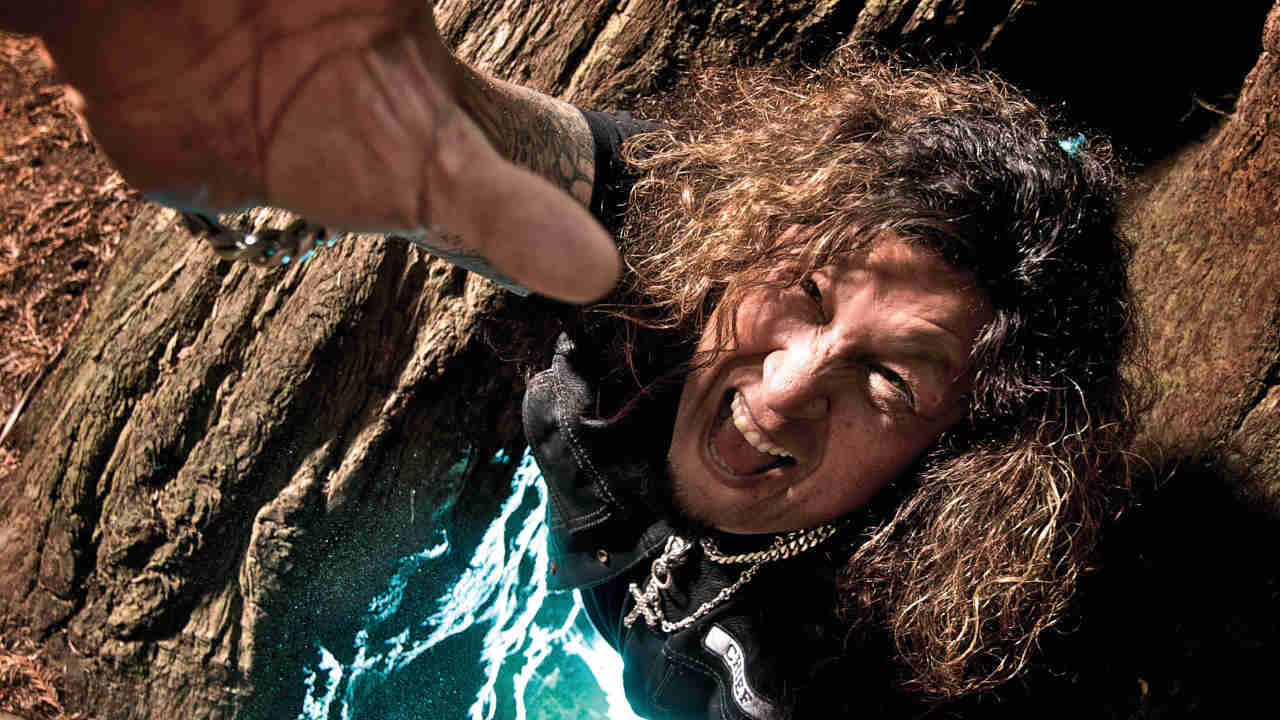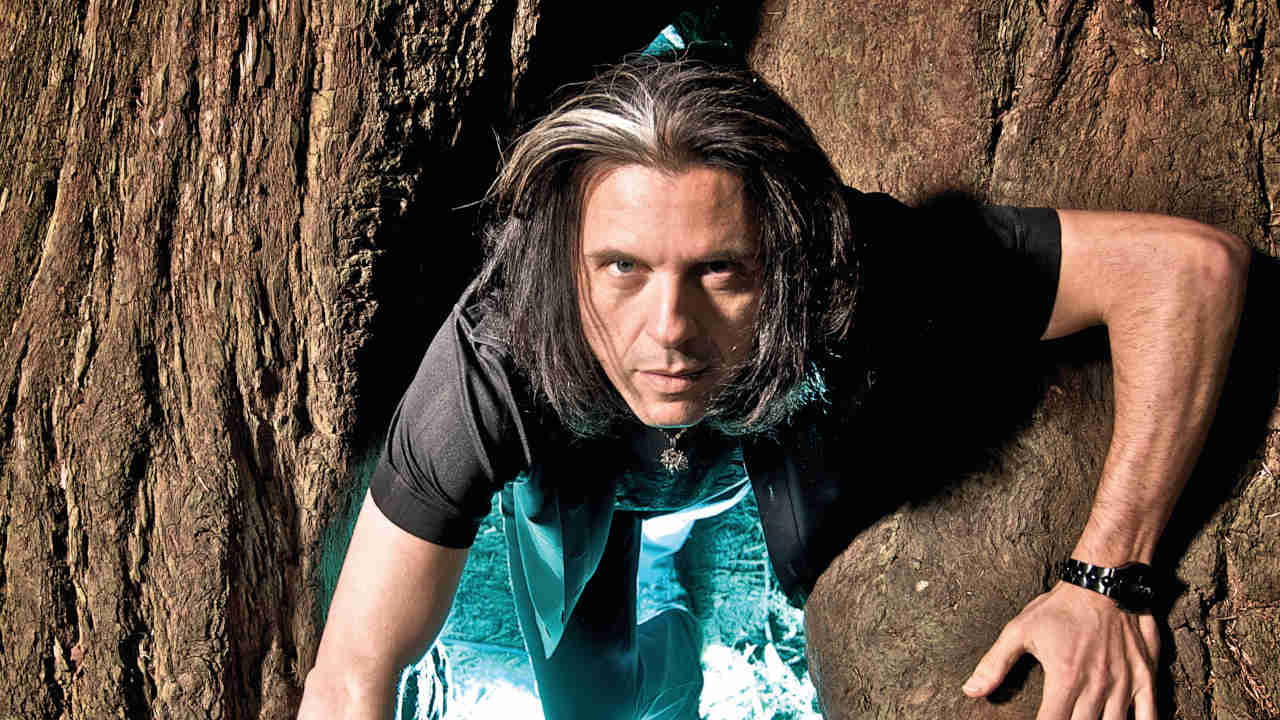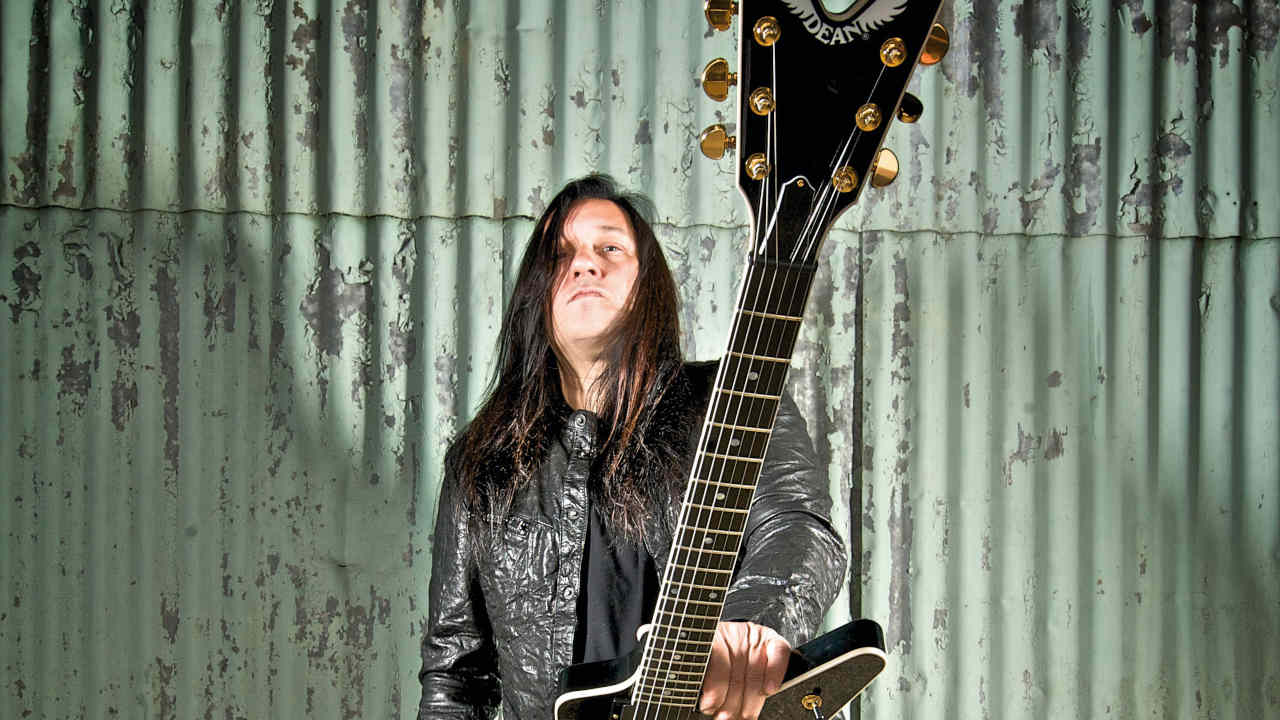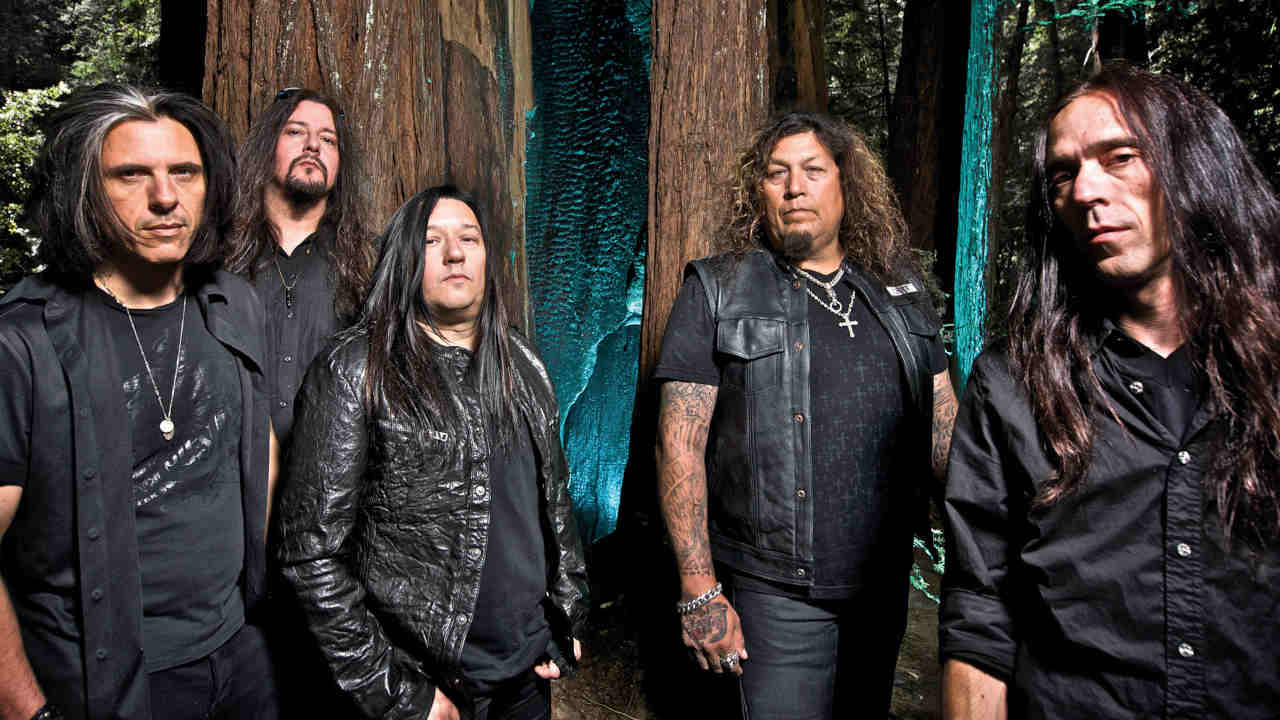Testament are one of thrash metal’s most dependable bands. In 2012, as they released their 11th album, singer Chuck Billy and guitarists Eric Peterson and Alex Skolnick looked back over the highs and lows of their career.
The ‘Big Four’ of thrash metal – Metallica, Slayer, Anthrax and Megadeth – all date back to 1981 save for the ’Deth, who came to be following guitarist Dave Mustaine’s expulsion from Metallica two years later. Down the years, this sacking and Mustaine’s vow to wreak “revenge” for the wrongdoing of his former bandmates became an apocryphal tale, as the legend of the genre’s top dogs grew, grew and grew some more. This furore reached frenzy point in 2010 when all four bands shared stages in America and Europe for the very first time.
The Big Four was a term coined back in the late 80s. Two decades later, maybe, just maybe, it’s time for some revisionism? Exodus, the Bay Area bangers from whom Metallica poached guitarist Kirk Hammett, had sprung to life before any of the Big Four. And although, like Megadeth, Testament are often considered gatecrashers (they formed as Legacy in 1983, releasing an all-time classic debut, The Legacy, three years later), the San Franciscans have inescapably created some of the very finest and most original music that thrash-metal has to offer.
Fans of Testament won’t need reminding that The Formation Of Damnation, featuring a reunion of four-fifths of their classic lineup, was hailed as Album Of The Year at Metal Hammer’s own Golden Gods ceremony in 2008. Yes, the moment in time Metallica sent us Death Magnetic.
Testament’s founding member, guitarist Eric Peterson, is here in London to discuss Dark Roots Of Earth, a follow-up to The Formation Of Damnation that in terms of quality matches almost anything released so far during the group’s almost three-decade history. He’s stoked that Hammer considers Testament’s 10th studio record a worthy successor to such an illustrious comeback…

And then we go and mention the Big Four. Suddenly, Eric doesn’t seem too keen on eye contact any more, gazing out of the window while reciting a well-drilled monologue to address a subject that he admits “comes up in every single interview” that he grants. Clearly, the lack of respect afforded to his band, (comparably speaking, at least) is a source of some irritation.
“Let me clear this up for you,” he says when Hammer makes it clear we won’t be fobbed off, “those bands were the ones that started up this genre. Testament was also a part of that, but we were a day late and a dollar short on all of that success.”
So it was all a question of perception, then?
“Yeah, quite probably. But we made our mark. Were the scene beginning over again now, and if it was up to me, I’d make it the Big Five,” Eric says, the smile gradually returning. “A hand has five fingers and a pentagram has five points. Would that fifth place go to Testament or Exodus or Overkill? I think it would probably have to be us, based on record sales and on what we’ve done.”
A solitary strand of consistency that runs through the 20-odd members to appear in the band’s ranks, Eric is immensely proud of Testament’s achievements.
“When this band first started I was still living with my mum,” smiles the guitarist, now two years off the Big Five-O. “Twenty-five years later, it’s been quite a ride. If I can make it to 65 then that would be killer.”
Just like Metallica et al, Testament had a major label deal and built a sizeable following on both sides of Atlantic, headlining the Hammersmith Odeon in London in 1990, yet unlike their rivals they were unable to push onto the next level. Much of this had to do with the departure of guitarist Alex Skolnick some three years later. “I’d reached a point where I wanted to play lots of styles of music,” explains Alex. “I love heavy metal but it’s not all I do; I never agreed with those that say you should only play one style of music.”
Bassist Greg Christian and drummer Louie Clemente also dropped out and by 1997’s Demonic, the band was no longer with Atlantic Records. “I don’t think Testament will ever do a bad record, but I look back at some of our older stuff and Souls Of Black, for instance, was done in a rush,” admits Eric. However, as time went by Chuck Billy began to realise how much he missed Alex.
“There’s something about the way he and Eric complement one another,” says the singer. “Some great guitarists and bass players were with us, but it was never the same without the original guys.”
Perhaps surprisingly, Eric volunteers: “I was happy when Alex said he was leaving. He was frustrated and so were we. For a while I wondered what on Earth we were going to do until a light-bulb went off and I realised: ‘I can be heavy now.’ We could thrash again.”
Recorded with ex-Slayer man Dave Lombardo on drums, 1999’s The Gathering put Testament back on an even keel but the following year, after visiting the doctor, a huge cancerous tumour in was discovered in Chuck’s chest cavity.
“It presented a huge mental challenge,” recalls the singer. “I thought my Testament career was done; I lost all my hair [after the chemo] and I just wasn’t the same person when I looked in the mirror. For a while I just focused on my family and friends and moving on. And then one day I put on a Testament CD. I hadn’t heard any of our music in two years, the songs felt completely new again... ‘Whoa, what’s this?’ It fired me up. ‘Let’s jam!’”
In August 2001 a benefit show for Chuck took place in San Francisco. As a consequence, the singer contacted his friend André Verhuysen, who runs the Dynamo Festival in Holland, who asked whether the classic lineup could reunite. “I made the calls, and everybody was in,” Chuck smiles.
“After being away from heavy metal I realised that I wanted to play it again,” explains Alex, whose participation was vital. “I didn’t know who I’d being playing it with, just that it felt right. And just as those thoughts began, Testament started calling about a reunion.”
“I always knew that Chuck would be OK, I was more concerned for [James] Murphy, who is a lot more fragile,” insists Eric, referring to the guitarist who had two spells with Testament and also won his own battle with cancer. “Though Chuck and I had some pretty heavy conversations about it, his attitude was quite casual. I couldn’t believe how fast his hair grew back: the metal gods just returned it to him.”
While Alex and Eric share many of the same influences, Eric believes that the reason they work so well together is because their styles are so different. “It’s the combination of the Yin and the Yang,” he proposes. “Alex is a nerdy guitar intellectual, I’m more about feel.”
“I’ve studied some very advanced music,” points out Alex, who was taught by Joe Satriani. “I can play a Mahavishnu Orchestra song or a John Coltrane composition, but I also enjoy The Beatles. And in between you have what Testament does. Eric and I have different vocabularies to draw upon. I’m more likely to mess around with a riff by Return To Forever [jazz- fusion band] whereas he would play something by Dimmu Borgir.”
The bottom line is that when you hear a Testament song, it’s instantly obvious to whom you’re listening. “It’s an honour to hear such things, which has a lot to do with our harmony riffs – especially on the first two albums,” says Alex. “When people say that along with my friend Marty Friedman [Megadeth] we changed the standard of lead guitar playing in heavy metal, that’s wonderful to hear because back then metal wasn’t a place where the real virtuoso players would go.”

In the four years since The Formation Of Damnation, Testament did an enviable job of re-establishing a brand name that was, in all fairness, slipping into decline. Besides headlining extensively, they performed opening duties on America’s Metal Masters tour with Judas Priest, Heaven & Hell and Motörhead before heading to Europe to join the headliners and Megadeth on the Priest Feast. “Over two and a half years we played all four corners of the globe,” Eric says. The continued availability of shows was such that Nuclear Blast Records had been trumpeting the release of Dark Roots Of Earth since November.
However, Testament didn’t have a drummer any more after extreme tendonitis left Paul Bostaph unable to play. Rhythm parts were supplied by Chris Adler of Lamb Of God and the man who eventually got the job full-time, Gene Hoglan (Fear Factory/Dark Angel/Death). “At first we also reached out to Dave Lombardo, who agreed to do it, but then he said we’d have to wait on him. At that point we’d already put the record off enough,” reveals Chuck.
The demanding schedule of mastermind producer Andy Sneap also meant that the Englishman could work on most but not all of the last record. Known for his work with Megadeth, Machine Head and Accept, Andy had mixed and engineered The Formation…, which was helmed by Chuck and Eric, but this time there was only one man to sit in the producer’s chair. “Andy is a great organiser and we really needed him to reel every- thing together,” says Eric. “At that stage we were so disorganised.”
Reading between the lines, thanks to a run of North American dates with Anthrax and Death Angel, the sessions were more rushed than the band would wish. Eric is of the opinion that this arrangement worked out for the better, though as much as Chuck loves the finished product it’s obvious that a niggling doubt or two remains.
“We had a meeting about cancelling the Anthrax tour because Chuck had sung just one lead vocal out of nine, but he insisted it wouldn’t be a problem,” recalls Eric. “Six of the songs were still without lyrics but he got it done – and I love what he did.”
According to Chuck, Dark Roots Of Earth is more sophisticated and complex than The Formation… “It’s a bit more polished; the songs aren’t just about all-out thrash,” he says. “I didn’t even hear two or three of them ’til they were already [instrumentally] recorded. My personal preference would have been for a couple more that were a little thrashier, in the vein of The Formation... Honestly, I probably wouldn’t have chosen those riffs to write songs with. Maybe I even heard them [at an earlier stage] and said: ‘Ahhh, I don’t care for those,’ but they somehow made the record.”
The frontman frets needlessly. The album might be a little darker in tone but it remains a monster. Among its standout moments is Native Blood, with lyrics based upon Chuck’s Pomo Indian heritage. “Writing a song like that has been in the back of my mind for a while. When I was ill my native heritage really helped to get me through,” explains Chuck, who now has a full certificate of health after his cancer battle. “Last year I was put into the Smithsonian Institute as a representative of Native Americans in pop culture, and I thought it was about time. The reservation where I grew up wasn’t the cleanest and there was never a lot of money. But although it was inspired by a tribe that needed help, I wrote it about any indigenous group that feels suppressed and craves being heard.”
This mindset continues with True American Hate, a song that in these troubled times could easily be regarded as jingoistic. Eric offers no apologies for this potentially provocative statement. “A lot of hatred is directed at America,” he says. “We’re a country that fights for democracy, the police of the world if you like. America does lots of good work. When I see people in the Middle East being oppressed for wearing an Iron Maiden shirt, it’s disgusting. The song says that we wish those that those burning the American flag could have a free life just like you and me.”

The album’s title song also pertains to environmental issues and its eye-catching artwork, painted by Eliran Kantor (Sodom, Atheist), offers rich earth/animal overtones. Says Eric: “When we came up with the title and began thinking about the sleeve, Cernunnos, the horned god of the forest in Celtic mythology, came immediately to mind.”
It’s easy to forget that Testament have been singing about the Greenhouse Effect since a song of the same name appeared on 1989’s Practise What You Preach. “Yeah,” agrees Eric proudly, “while other bands were writing about ‘stab it!’ or ‘kill it!’ we were already talking about that stuff.”
Chuck is exasperated. “Look at how different the seasons have become: it’s a hundred degrees at Christmas time. In the UK it’s been raining for most of the summer. We’ve written about that stuff for 25 years and now it’s happening right before our eyes. We could almost say: ‘I told you so.’”
It’s just another example of the disrespect often paid to this fine band. “Our industry is all about being in the right place at the right time,” muses Chuck, turning the conversation back to the Big Four. “Those were the four bands that sold a lot of records and did great business, but we were on the tail end of it all. Had the climate of music not changed and the radio not stopped playing metal, things might have been different for us.”
Luckily, Testament are handily placed at the forefront of a second wave of thrash. “It’s not something that I’d have predicted,” marvels Alex. “MTV has given up the pretence of caring about music; it only has reality shows about pregnant teenagers. But there are enough outlets for people to make up their own minds. We’re no longer beholden to the trendsetters.”
The rebirth of thrash has spawned a wave of younger musicians queuing up to worship at the altar of the 80s originals. With Trivium leading from the front, a new generation of acts including Evile, Municipal Waste, Gama Bomb, Cauldron, 3 Inches Of Blood, Bonded By Blood and Volture has erupted across the globe, proud of their black skinny jeans and high-top white trainers.
“I’ve heard Evile and Municipal Waste but they didn’t blow me away,” Eric admits. “It’s flattering that they would pay lip service to bands like ours, but there’s just too little originality. They’re younger than us so they’ve got to be better than us. Otherwise what’s the point? Sorry guys, but that’s my honest opinion.”
Originally published in Metal Hammer issue 234

